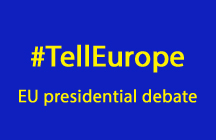Seven days before the start of the European Elections, the Spitzenkandidaten running for the presidency of the European Commission confronted each other in another debate.
The live TV debate, held in the European Parliament in Brussels on Thursday 15th May, proved to be the largest of a series of three debates, shown across Europe in 24 languages and on 49 TV channels. A total of 63,000 Tweets were sent out during the 90 minutes of confrontation, exceeding the 47,000 sent during the first televised debate in Maastricht.
The candidates focused on the leading issues of the EU debt crisis, immigration, the Ukraine crisis, Brussels lobbying, youth unemployment and religion. For the first time, Alexis Tsipras, Greek far-left candidate for the GUE group, participated in the debate and, therefore, burst the “EU bubble” style that characterized the previous debates.
 However, Tsipras focused almost exclusively on Greece and his own Syriza party. Despite hopes that Tsipras would provide constructive criticism about the future of the EU. Instead, he accused Jean-Claude Juncker, former head of the eurogroup and centre-right nominee for the EPP group, of conspiring behind closed doors with Angela Merkel, the German chancellor, to “remove democratically elected leaders in Greece and Italy and replace them with bankers and bureaucrats”.
However, Tsipras focused almost exclusively on Greece and his own Syriza party. Despite hopes that Tsipras would provide constructive criticism about the future of the EU. Instead, he accused Jean-Claude Juncker, former head of the eurogroup and centre-right nominee for the EPP group, of conspiring behind closed doors with Angela Merkel, the German chancellor, to “remove democratically elected leaders in Greece and Italy and replace them with bankers and bureaucrats”.
Tsipras also criticised Juncker’s austerity policy, to which the latter rebuked: “For years I worked day and night to avoid Greece falling out of the euro […] we did everything to ensure that Greece stayed in." Guy Verhofstadt, candidate for the liberal group ALDE, said: “In Greece, in Italy, it wasn’t a matter of banking, but bad policies on the part of your political parties”.
Martin Schulz, centre-left candidate for the S&D group, promised to focus on "fighting against tax fraud and tax evasion and for equal life chances" and laid out plans for a microcredit program to support SMEs and grow Europe’s economy.
Ska Keller, the German candidate for the Green party, claimed interest groups and business have too much power over lawmakers and that the EU needs “a Europe of citizens”. She pleaded for more investment in a greener and more sustainable economy.
Between 22nd and 25th May, 400,000 European citizens will be invited to cast their vote. A recent poll puts the EPP in a slender, three seat, lead over the S&D.
On Tuesday 27th May, two days after the results will have been announced, EU heads of state and government will meet in Brussels to choose their preferred candidate, taking into account the results of the elections, and put him/her forward to the European Parliament. The nominee will then be elected by MEPs at the plenary session between 14-17th July. If he/she does not get the required majority, the European Council will have a month to propose a new candidate.














